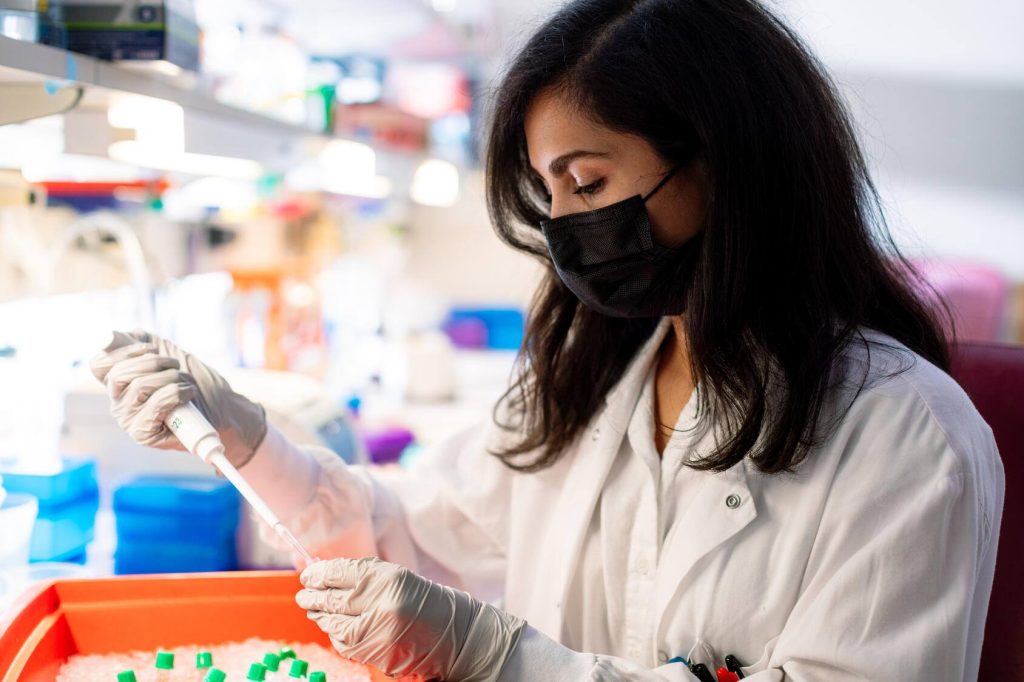-
Featured News
Mayo Clinic researchers develop new antibody test to diagnose MS

ROCHESTER, Minn. — Mayo Clinic researchers have validated a new antibody test to diagnose multiple sclerosis (MS), a potentially disabling disease of the brain and spinal cord. Nearly 1 million people in the U.S. are affected by MS, according to the National Multiple Sclerosis Society.
An antibody typically consists of two immunoglobulin heavy chains and two light chains. There are two types of light chains: kappa and lambda. The validated test measures kappa immunoglobulin free light chains in cerebrospinal fluid. The authors conclude the test is a valid alternative to a commonly used test to detect oligoclonal bands in cerebrospinal fluid, according to findings published in Mayo Clinic Proceedings. Oligoclonal bands are proteins that indicate inflammation of the central nervous system.
"Among the advantages of kappa measurement is that it's a much easier test to run in the laboratory," says Ruba Saadeh, a research fellow in neuroimmunology in Mayo Clinic's Department of Laboratory Medicine and Pathology, and the study's first author. "Our findings represent a cost savings as well as an automated alternative to the arsenal of tests used to diagnose multiple sclerosis."
MS is a disease that affects the brain and spinal cord, and can lead to deterioration and permanent damage of the nerves. While its cause is unknown, the disease triggers the immune system to attack the protective coating on nerve fibers. This disrupts signals between the brain and spinal cord. Symptoms vary widely. These symptoms depend on the amount of nerve damage and which nerves are affected. Symptoms can be temporary or long-lasting.
While no cure for MS has been found, treatments can speed recovery from attacks and manage symptoms.
The diagnostic test that detects oligoclonal bands in cerebrospinal fluid requires about four hours of analytical processing. This test is labor-intensive and involves subjective visual interpretation. The Mayo study validates a diagnostic value of 0.1 milligrams per deciliter to measure kappa free light chains. The study's results are comparable to diagnostic values from tests measuring oligoclonal bands.
The study analyzed serum samples from a retrospective cohort of 702 Mayo patients to determine a diagnostic value for measurement of kappa free light chains. Samples from a prospective cohort of 657 Mayo patients were used to validate that value. Of the more than 1,300 patients, 12% were diagnosed with MS.
"Kappa free light chain measurement in cerebrospinal fluid is relatively new, and various published studies have attempted to decide what is the best medical decision point for optimal performance of the test," says Maria Alice Willrich, Ph.D., a Mayo Clinic pathologist and the study's senior author. "Based on our study data, we identified the optimal performance of the test for a large U.S.-based population."
The study estimates a significant cost savings for the new test. Better yet, results are available in about 20 minutes.
"The laboratory technologist training can be standardized because of the automation involved in this process, and the subjective visual interpretation of bands and personnel involvement is substantially reduced," Dr. Willrich says.
The study was funded in part by Mayo Clinic's Department of Laboratory Medicine and Pathology and was supported by a grant from the National Center for Advancing Translational Sciences. The authors report no competing interests.
Journalists: Video of Saadeh and Dr. Willrich discussing this study is available here.
###
About Mayo Clinic Proceedings
Mayo Clinic Proceedings is a monthly peer-reviewed journal that publishes original articles and reviews on clinical and laboratory medicine, clinical research, basic science research, and clinical epidemiology. The journal, sponsored by Mayo Foundation for Medical Education and Research as part of its commitment to physician education, has been published for 95 years and has a circulation of 127,000.
About Mayo Clinic
Mayo Clinic is a nonprofit organization committed to innovation in clinical practice, education and research, and providing compassion, expertise and answers to everyone who needs healing. Visit the Mayo Clinic News Network for additional Mayo Clinic news.
Media contact:
- Jay Furst, Mayo Clinic Public Affairs, newsbureau@mayo.edu







